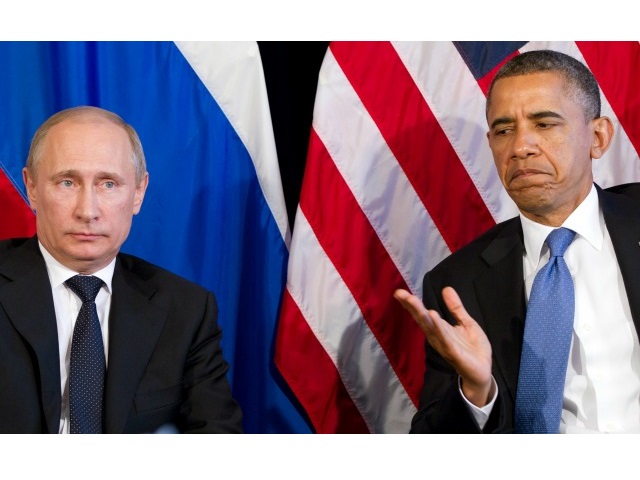
A number of former officials in both Presidents Bush and Obama’s administrations told Reuters this weekend they believe the crisis in Ukraine was largely fueled by long-term post-Cold War apathy towards Russia on the part of the United States, something President Vladimir Putin long resented.
Reuters notes that U.S.-Russia relations under Putin appeared to peak in the aftermath of the September 11 attacks. Putin allowed use of Russian airspace for sending humanitarian aid to places like Afghanistan, and expressed solidarity with what was considered a former enemy nation. That all began to change as the United States called for the expansion of NATO, an organization Russia objected to as obsolete after the collapse of the Soviet Union. The United States did so while emphasizing foreign relations with China, Iraq, and other significant allies that had arrived on the scene more recently than Russia. Reuters quotes former U.S. Ambassador to Moscow James F. Collins as saying the United States was not “really paying attention… [Russia] was seen as not a big deal” during his tenure in the late 1990s.
While some officials in the Bush administration appeared overly focused on the two new warfronts facing the nation, others, like Vice President Dick Cheney, called for the expansion of NATO. Countries like Latvia, Lithuania, and Estonia joined, while attempts were made to include the newly pro-American nations of Georgia and Ukraine on the list. Russia, Reuters argues, was especially aggrieved by having anti-Putin leaders in both those nations after the Rose Revolution and Orange Revolution, respectively, heralded in the tenures of Mikheil Saakashvili and Viktor Yushchenko.
Saakashvili’s call for an expansion of the Georgian economy to save the nation from the iron grip of Russia resulted in an all-out invasion of his country in 2008. As Russia has done with the Ukrainian state of Crimea this year, Putin invaded Georgia territories Abkhazia and South Ossetia, establishing a permanent presence there. Saakashvili, writing for the New York Times in the weeks preceding the 2014 Sochi Winter Olympics, noted the consequences of that: “Abkhazia’s capital, Sukhumi, is half in ruins; the only visible construction is on Russian military bases. More than 70 percent of Abkhazia’s pre-war population has been expelled and the place looks deserted and gloomy.”
The consequences of not including Ukraine in NATO and the failure of the United States to establish a relationship that was either friendly or commanding over Putin–and not something apathetic in between–are plain to any observer today.
While most of Reuters’ analysis focuses the blame on the Bush administration, President Obama’s misfires do not escape scrutiny. One major issue–the diplomatic debacle in allowing Putin to intervene in the Syrian Civil War–does go unmentioned. But the Reuters report blames President Obama for “plummeting” U.S.-Russia relations that have been at their worst in decades: “In June, Putin granted asylum to National Security Agency whistleblower Edward Snowden. Obama, in turn, cancelled a planned summit meeting with Putin in Moscow that fall. It was the first time a U.S. summit with the Kremlin had been cancelled in 50 years.” Snowden is slowly evolving into a useful celebrity for Kremlin propaganda, lobbing a softball question on surveillance to Putin this week on a Russia Today special.
The report stops short of offering a solution, but in chronicling all the misfires of United States diplomacy along the way, backtracking proves useful. The main error in U.S. diplomacy that has led to this, the report argues, is not taking Russia seriously. Not taking Putin seriously. And that lesson is one the people of Ukraine must suffer for America to learn.

COMMENTS
Please let us know if you're having issues with commenting.